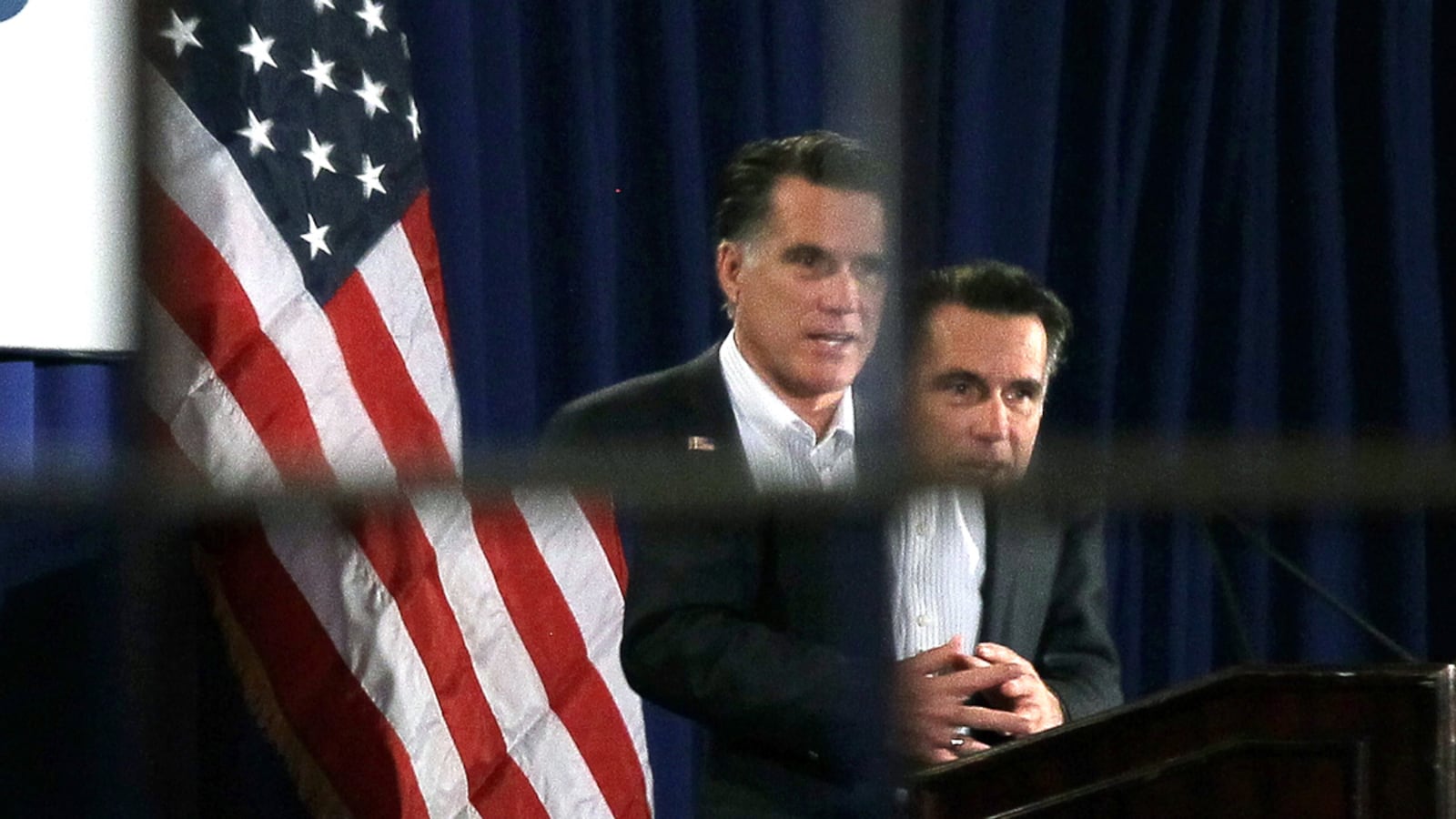At a closed-door fundraiser the other day, Mitt Romney confided to his money people what he really plans to do as president:
“I’m going to probably eliminate for high-income people the second-home mortgage deduction.”

So the man campaigning in the Republican race as an unabashed champion of the wealthy has a little surprise in store for those who have summer-vacation homes. And after having vowed to veto the DREAM Act, which offers some illegal immigrants a path to citizenship, Romney told the donors that he would offer “a Republican DREAM Act.”
In politics, the flip-flopper label is deemed deadly, the fingering of a candidate with no fixed principles. But I suspect that, with swing voters at least, it helps Romney. If voters believe he was just throwing red meat to voracious primary voters—and that the real Mitt would govern as a sensible man of the center-right—the damage of the last few months could be mitigated.
During the primaries, says GOP strategist Alex Castellanos, “even the Republicans had a hard time believing him. Why would general-election voters feel any differently?”
Castellanos, who worked for Romney in 2008, says that “people see him as a practical, reasonable guy. I think it’s going to be hard to paint the guy who was not conservative enough in the Republican primaries as a crazy, wild-eyed conservative lunatic.”
But that doesn’t mean President Obama’s campaign won’t try. “There’s no doubt that Governor Romney has lost trust with voters across the political spectrum for making promises he then walked away from when the political audience changed,” says campaign spokesman Ben LaBolt. “He called himself severely conservative and the ideal Tea Party candidate, and then committed to policies that earned him those labels.”
Therein lies the paradox: Romney will clearly benefit in November if enough voters view him as a financial Mr. Fix-It, rather than a heartless hard-liner. But that means they would have to dismiss his words as typical political flimflam.
“No one believes he was the most conservative candidate in the race,” says former House Republican official John Feehery. “That’s the fun thing. For the last six months Romney’s been accused of being a moderate, and that’s going to turn out to be a real advantage going into the general election.”
His cautious demeanor may be a factor. Romney just doesn’t sound like a fire-breathing ideologue. “He is hard to love—that’s an endemic Romney problem—but he is also hard to hate,” says Castellanos. “He is not a candidate of passion; he has proven that.”
The pivot that Romney is attempting to make—to attract what an outside adviser calls “ticket-splitters"—is crucial. “It is a mistake to focus too much on the base,” this adviser says. “Simply put, GOP primary voters are not a problem in the general election. Historically they are very reliable voters for the party in the general election, even if they like the Republican nominee more than they love him.”
Questions of consistency have dogged Romney for two decades. He was a classic Massachusetts moderate, running to Ted Kennedy’s left on some issues in 1994, until a half-dozen years ago, when he began to covet the GOP presidential nomination. By 2008 the pro-choice former governor was opposing abortion. By 2012, the author of his state’s health-insurance mandate was insisting his program was nothing like Obamacare. And he toughened up his rhetoric against illegal immigration, Planned Parenthood, and other issues dear to the Tea Party right.
Democratic operatives will undoubtedly focus on other Romney comments from that private fundraiser, reported by NBC and The Wall Street Journal, such as that he would merge or abolish a number of federal agencies—including the Housing and Urban Development Department once run by his father. The attack line: Romney wants to protect the rich while cutting programs that help the less fortunate.
The Romney campaign did not respond to a request for comment.
But on a conference call Monday, former Sen. Jim Talent said that at the private fundraiser Romney “was just discussing ideas that were coming up on the campaign trail. There wasn’t any change in policy.”
LaBolt of the Obama camp pointed to, among other things, Romney’s budget plans, which would extend the Bush tax cuts for the wealthiest Americans. “That is the platform he is running on, and we’re going to ensure that there won’t be any opportunities to Etch a Sketch the record,” he says.
No Romney adviser could say this out loud, but one strategist who has the candidate’s ear says the campaign is well aware of the potential benefit of having his conservative credentials doubted—and believes the Obama team is worried about the development.
It is, to be sure, downright counterintuitive. Candidates seemingly live and die by their words. From the time that LBJ was accused of a Vietnam credibility gap and Richard Nixon insisted he was not a crook, veracity problems were assumed to be the kiss of death for those in the Oval Office and those who wanted to occupy it.
Yet Romney’s chances may depend on voters refusing to believe he is a true right-winger—that is, viewing him as a dissembler.
If he wins, Romney’s ability to indulge whatever moderate instincts he may be suppressing will be greatly constrained by his campaign rhetoric, as the Republican base pressures him to keep his promises. The question for November is whether less conservative voters will see him as having his fingers crossed behind his back.






